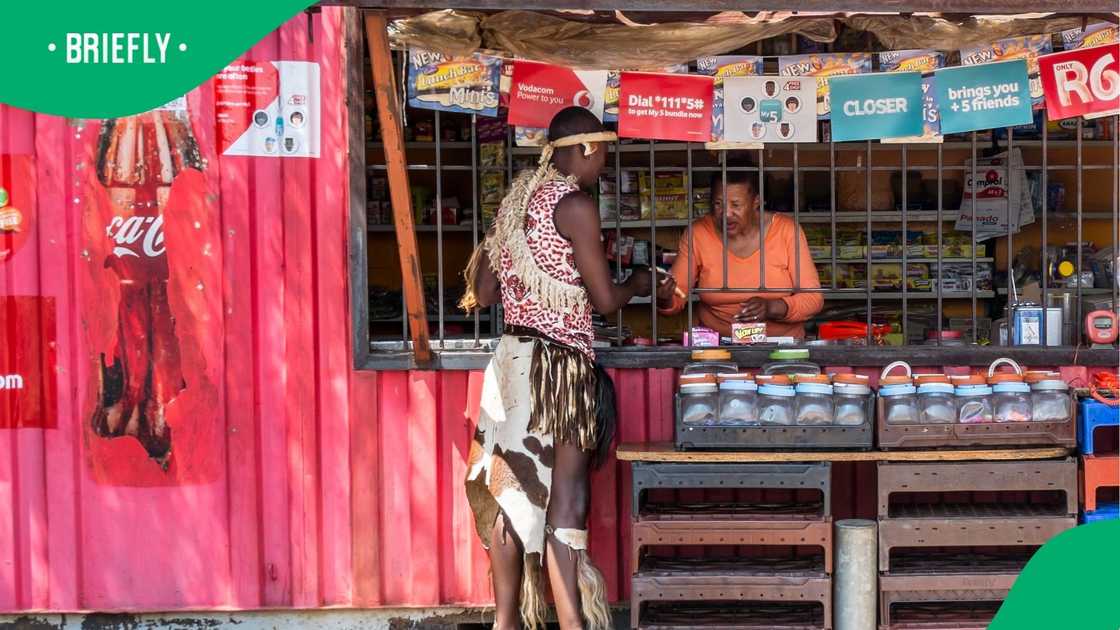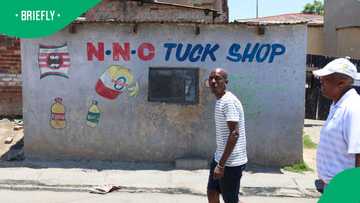Government Launches R500 Million Spaza Shop Support Fund to Boost Local Businesses
- Applications for the highly anticipated Spaza Shop Support Fund (SSSF) have been officially opened
- The fund aims to provide funding of up to R300 000 per shop through a combination of grants and low-interest loans
- Funds can be used for initial stock purchases, improvements, business development tools, and the adoption of point-of-sale (POS) systems
- Briefly News spoke to Albert Jeleni, the president of the National Union of Municipal Chambers of Commerce and Industry about the fund
The South African government has officially opened the applications for the R500 million Spaza Shop Support Fund. The purpose of the fund is to increase the participation of South African-owned spaza shops in rural areas and townships and to create a formalised and inclusive sector that is beneficial for all South Africans.

Source: Getty Images
How does it work?
According to its website, the Spaza Shop Support Fund, backed by the Department of Small Business Development (DSBD) and the Department of Trade, Industry and Competition (DTIC), is designed to support township and rural convenience stores (spaza shops) through both financial and non-financial assistance.
The fund provides funding for up to R300 000 per shop, which can be used for stock purchases, improvements, and development tools. It is made up of grants and low-interest loans. The fund will also provide shop owners with training and assistance in meeting hygiene and regulatory standards to ensure high-quality and safe products.
PAY ATTENTION: Briefly News is now on YouTube! Check out our interviews on Briefly TV Life now!
The fund will be administered by the National Empowerment Fund (NEF) and the Small Enterprise Development Finance Agency (SEFDA).
The funds may not be used for personal expenses or any costs unrelated to business development, including the sale of alcoholic beverages. It should be used to purchase goods and services from accredited local suppliers that meet all relevant regulatory standards, particularly for setup and operational expenses.
What the Minister said
The Minister of Trade, Industry, and Competition, Parks Tau, believes that the support fund will play a crucial role in creating jobs, fighting poverty, promoting economic inclusion, and stimulating local economic growth. He said that the government is committed to ensuring that every South African is benefiting from this fund.
The Minister believes that the fund is a step closer to formalising the informal sector. This means that more opportunities arise for local talent and a decrease in poverty in townships. The fund will also create workspaces that are secure and sustainable and not only economically beneficial.

Source: Getty Images
Who qualifies for funding?
In order to qualify for the support fund, one must be a South African citizen with a spaza shop operating in a rural or township area. The shop must be registered with the municipality and with the Companies and Intellectual Property Commission (CIPC). The company must have a valid registration with the South African Revenue Service (SARS).
Briefly News talks to NUMCCI about fund
Briefly News spoke to Albert Jeleni, the president of the National Union of Municipal Chambers of Commerce and Industry about the fund.
"The R500 million Spaza Shop Support Fund is a commendable initiative aimed at uplifting black South African entrepreneurs. By offering up to R300,000 per shop, the fund addresses immediate financial needs. However, for sustained impact, it should also focus on integrating local shop owners into broader supply chains (the whole sellers), facilitating bulk purchasing agreements, and providing training on modern retail practices," he said.
3 more stories about spaza shops
- Gauteng MEC for Finance and Economic Development, Lebogang Maile, revealed that a large portion of spaza shop registration applications were submitted by foreign nationals.
- Tshwane Mayor Dr Nasiphi Moya reiterated her stance that spaza shops should be exclusively owned by South Africans.
- The South African government declared foodborne deaths a national disaster following the deaths of more than 20 children who consumed snacks bought from spaza shops.
PAY ATTENTION: Follow Briefly News on Twitter and never miss the hottest topics! Find us at @brieflyza!
Source: Briefly News




